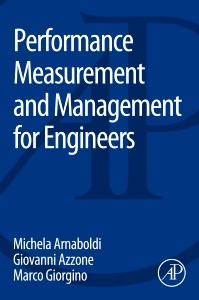Description
Performance Measurement and Management for Engineers
Authors: Arnaboldi Michela, Azzone Giovanni, Giorgino Marco
Language: English
Subjects for Performance Measurement and Management for Engineers:
46.15 €
In Print (Delivery period: 14 days).
Add to cart184 p. · 15x22.8 cm · Paperback
Description
/li>Contents
/li>Readership
/li>Biography
/li>Comment
/li>
Performance Measurement and Management for Engineers introduces key concepts in finance, accounting, and management to project managers who have engineering backgrounds. It focuses these basic concepts on issues of measuring and managing enterprise value. Thus, after defining enterprise value, the book begins by explaining the ways and means of measurement. It then takes up financial measurement, describing and analyzing the typologies of financial indicators while illustrating their advantages and disadvantages. After focusing on measuring enterprise value, the second section takes up managing that value. Like the first, it pursues a double view: using indicators for internal control while employing them to analyze other companies. If engineering project managers possess a source of quantitative and qualitative information about business management, Performance Measurement and Management for Engineers will help them increase their contributions to the business.
1. Introduction
PART 1: MEASURING ENTERPRISE VALUE
2. Value Based Management Indicators
3. Accounting Based Measures
4. Value Driver Measures
5. Scorecards
PART 2: MANAGING ENTERPRISE VALUE
6. Target Setting: Budgeting and Risk Management
7. Long and Short Term Decision Making
8. Performance Control for Organizational Units
9. Performance Control for Projects
10. Forms and Techniques for Financing
Appendix - Financial Accounting: an Overview
Upper-division undergraduates and graduate-level science and engineering students worldwide.
Giovanni Azzone has served as Chairman of the Evaluation Committee and member of the Board of Management of the Office of Internal Control of the Presidency of the Council of Ministers. He has published in International Journal of Public Sector Management, Journal of Organizational Change Management, and Studies in Higher Education.
Marco Giorgino is Professor of Corporate Finance and Global Risk Management. He teaches Corporate Finance, Corporate and Investment Banking, Risk Management, the Master of Science in Management Engineering, and he is the author of over 80 publications, books and articles on banking and financial services.
- Explains how main performance indicators are related to the value of the company
- Reveals how to assess the financial needs of companies in relation to their financial goals and mechanisms (e.g., equity, debt, and hybrid)
- Describes key information and indicators for assessing the ability of enterprises to create value across time
- Indicates the profitability sources of different business units




